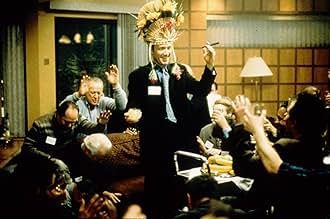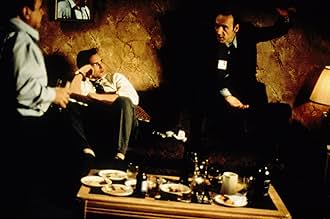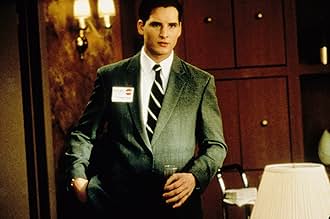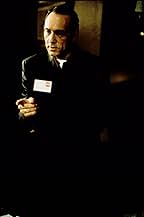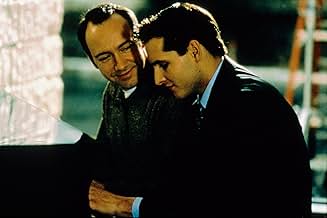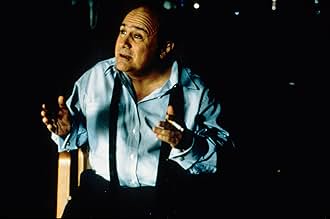CALIFICACIÓN DE IMDb
6.5/10
15 k
TU CALIFICACIÓN
Dos vendedores veteranos examinan una propuesta de venta de un cliente particular a través de su joven discípulo.Dos vendedores veteranos examinan una propuesta de venta de un cliente particular a través de su joven discípulo.Dos vendedores veteranos examinan una propuesta de venta de un cliente particular a través de su joven discípulo.
- Premios
- 1 nominación en total
Danny DeVito
- Phil Cooper
- (as Danny Devito)
Christopher Donahue
- Bartender
- (sin créditos)
Ron Komora
- The Big Kahuna
- (sin créditos)
Frank L. Messina
- Business Man
- (sin créditos)
George F. Miller
- Hotel Patron Leaving Lobby
- (sin créditos)
Jen Taylor
- Mrs. Jen Johnson
- (sin créditos)
Opiniones destacadas
This refreshingly intelligent film delivers raw intellectual power by retaining the look and feel of the play from which it was adapted. The use of a single set and just three actors throws the emphasis entirely upon the in-depth character studies, the incisive dialogue and the actors' outstanding performances. It draws us into the lives of three seemingly ordinary guys at a convention whose interaction broaches questions that are nothing short of an examination of the meaning of life. The dialogue unabashedly strips the characters naked to show the ironies and hypocrisies inherent in their strategies for establishing meaning in the machinations of mundane lives. The laser sharp exchanges slash relentlessly at the souls of each, leaving none of the characters intact by the end of the film. And with each thrust, they drive another introspective probe deep into the psyche of the viewer.
The presentation reminded me a little of `Glengarry Glen Ross' with its theatrical feel and deep reflective tone, although this film was more confronting and less darkly despondent. Roger Roeff's penetrating script approaches the meaninglessness of life from three unique perspectives. We have Larry (Kevin Spacey) the seemingly superficial cynic who has far greater depth than he lets on and who uses his sardonic persona as a defense mechanism to hide his own fears. Phil (Danny DeVito) is the pragmatic but jaded salesman who is great at putting things in perspective for everyone but himself. Bob is the naïve young Christian zealot whose antidote for the futility of life is a strong dose of Jesus.
The juxtaposition of Larry the cynic and Bob the idealist makes for numerous thought provoking exchanges, especially when we learn that Phil (our mediator and voice of reason) is drowning in his own soul-searching quest for meaning. The story poses more questions than it does answers, and sputters a bit at the end, but overall it accomplishes its purpose of making the viewer ponder profundities easily ignored while in the pursuit of everyday priorities.
The acting was brilliant. Kevin Spacey gave what I thought was the best performance of his career. This was so much more interesting and meaty a character than he played in `American Beauty' that Spacey easily eclipsed even that outstanding performance. Larry was such a dynamic and complex character, that Spacey was able to open up the throttle and show us the full measure of his considerable talents. Likewise, Danny DeVito delivered a personal best in a serious dramatic role. His portrayal of the mediator who was trying to keep the peace while he was disintegrating inside was subtle and powerful. Peter Facinelli was also near perfect with an utterly believable and sincere performance as the pure hearted whelp whose heart was suffused with the Lord.
I rated this film a 9/10, but it requires a certain type of viewer to enjoy it. It is a very intellectual film, which precludes it from having much mass appeal. Action junkies will be bored to tears. However, for those who have a philosophical bent, this film will be highly satisfying.
The presentation reminded me a little of `Glengarry Glen Ross' with its theatrical feel and deep reflective tone, although this film was more confronting and less darkly despondent. Roger Roeff's penetrating script approaches the meaninglessness of life from three unique perspectives. We have Larry (Kevin Spacey) the seemingly superficial cynic who has far greater depth than he lets on and who uses his sardonic persona as a defense mechanism to hide his own fears. Phil (Danny DeVito) is the pragmatic but jaded salesman who is great at putting things in perspective for everyone but himself. Bob is the naïve young Christian zealot whose antidote for the futility of life is a strong dose of Jesus.
The juxtaposition of Larry the cynic and Bob the idealist makes for numerous thought provoking exchanges, especially when we learn that Phil (our mediator and voice of reason) is drowning in his own soul-searching quest for meaning. The story poses more questions than it does answers, and sputters a bit at the end, but overall it accomplishes its purpose of making the viewer ponder profundities easily ignored while in the pursuit of everyday priorities.
The acting was brilliant. Kevin Spacey gave what I thought was the best performance of his career. This was so much more interesting and meaty a character than he played in `American Beauty' that Spacey easily eclipsed even that outstanding performance. Larry was such a dynamic and complex character, that Spacey was able to open up the throttle and show us the full measure of his considerable talents. Likewise, Danny DeVito delivered a personal best in a serious dramatic role. His portrayal of the mediator who was trying to keep the peace while he was disintegrating inside was subtle and powerful. Peter Facinelli was also near perfect with an utterly believable and sincere performance as the pure hearted whelp whose heart was suffused with the Lord.
I rated this film a 9/10, but it requires a certain type of viewer to enjoy it. It is a very intellectual film, which precludes it from having much mass appeal. Action junkies will be bored to tears. However, for those who have a philosophical bent, this film will be highly satisfying.
The Big Kahuna
This three-character movie, based on the play by Roger Rueff, deals with salesmen who are somewhat impatiently waiting for a very important business client - a.k.a. The Big Kahuna - on whom the fortunes of their company rests. Should they land the contract with this mysterious bigwig, their company will prosper. If they don't land the contract, of course, then they're all sunk.
Larry (Kevin Spacey) and Phil (Danny DeVito) are the salesmen, and Bob (Peter Facinelli) is the marketing guy. Bob's a rookie, and Larry and Phil try to prep him for handling himself with potential customers. They've rented the hospitality suite in the hotel to entertain their clients and are planning on having a small party, hoping that the Big Kahuna will show up. No, it's not Waiting for Godot, but it's along those lines.
This is basically a character study. There's a lot of dialog - virtually the entire movie takes place in the suite, with only a few very minor scenes outside it - and each word is absolutely dripping with meaning. There aren't any throwaway lines in this movie, folks. Most movies contain generic lines that would fit in any similar movie. Not this one. If you're a fan of well-written movies, this is a prime example of how one should be constructed.
But with such an emphasis on the dialog, there's naturally little action. This is always a problem with movies based on plays. They come off restrained, stagey, and claustrophobic. But the lack of action actually gives the viewer the opportunity to watch two decidedly different acting styles. Spacey is bombastic, punctuating each syllable with a sneer or a rant. DeVito, on the other hand, is more reserved and appears wizened as a result. Each actor turns in a stunning performance, with Spacey basically reprising the role he played in Glengarry Glen Ross. The only one who seems out of place is Facinelli, who is ineffective as Bob the marketing guy.
The Big Kahuna is compelling, as long as you don't mind talky comedy-dramas.
This three-character movie, based on the play by Roger Rueff, deals with salesmen who are somewhat impatiently waiting for a very important business client - a.k.a. The Big Kahuna - on whom the fortunes of their company rests. Should they land the contract with this mysterious bigwig, their company will prosper. If they don't land the contract, of course, then they're all sunk.
Larry (Kevin Spacey) and Phil (Danny DeVito) are the salesmen, and Bob (Peter Facinelli) is the marketing guy. Bob's a rookie, and Larry and Phil try to prep him for handling himself with potential customers. They've rented the hospitality suite in the hotel to entertain their clients and are planning on having a small party, hoping that the Big Kahuna will show up. No, it's not Waiting for Godot, but it's along those lines.
This is basically a character study. There's a lot of dialog - virtually the entire movie takes place in the suite, with only a few very minor scenes outside it - and each word is absolutely dripping with meaning. There aren't any throwaway lines in this movie, folks. Most movies contain generic lines that would fit in any similar movie. Not this one. If you're a fan of well-written movies, this is a prime example of how one should be constructed.
But with such an emphasis on the dialog, there's naturally little action. This is always a problem with movies based on plays. They come off restrained, stagey, and claustrophobic. But the lack of action actually gives the viewer the opportunity to watch two decidedly different acting styles. Spacey is bombastic, punctuating each syllable with a sneer or a rant. DeVito, on the other hand, is more reserved and appears wizened as a result. Each actor turns in a stunning performance, with Spacey basically reprising the role he played in Glengarry Glen Ross. The only one who seems out of place is Facinelli, who is ineffective as Bob the marketing guy.
The Big Kahuna is compelling, as long as you don't mind talky comedy-dramas.
For some, this movie might seem quite boring. What's the point in watching three men talking in one room for almost two hours?! But tell you what?.. this movie is not boring at all! There's almost no storyline to speak of, but the script is more than beautiful. It will turn you into one big attentive ear. In addition, Kevin Spacey with his wonderful performance and entertaining sense of humor and wit made this movie a must-see. The movie doesn't want you to side with any of the three characters; it simply displays three different samples of human nature, and their views on the world (especially the concept of appearance vs reality).
Though essentially little more than a stage bound version of the play, `Hospitality Suite,' the film entitled `The Big Kahuna' earns distinction for its sharply delineated characters and the finely wrought performances of its three main actors. In fact, the stage origins of the film are evident in the fact that the action rarely extends beyond a single set a hotel suite in Wichita, Kansas in which three salesman are gathered for a convention and the fact that only four people are even assigned speaking parts (and even the fourth is a mere walk-on bellboy). All the other people we see serve as a kind of silent backdrop before which the three principal players enact their complex personal drama.
Kevin Spacey, in a truly brilliant performance, plays Larry, a middle-aged, sardonic salesman who sees life strictly from the perspective of a hardcore cynic and who, consequently, runs roughshod over his two business associates with his acerbic wit and hardnosed bluntness. In total contrast is Bob (Peter Facinelli), a 20-something neophyte to the selling business, a sincere, well-intentioned, but hopelessly naïve born-again Christian, who has trouble separating his career as a salesman from his felt need to fulfill the Biblical edict to go out among men and spread the Good News. Caught between the two is Phil (Danny DeVito), a 52-year old man who, after years of devoting his life to the cause of selling, has begun to seriously question the validity of his life's work and has, therefore, recently found himself contemplating such weighty matters as suicide, the existence of God and the meaning of love and friendship. Obviously, such cleanly delineated characters could well have slid over into two-dimensional stereotypes, yet the author, Roger Rueff, in adapting his play to the screen, has built into each of the three principal figures a dimension of multifaceted human complexity. Larry, for instance, despite all of his facile cynicism, shows a far deeper side to his character when, in a quiet moment in which Phil pours his heart out to him, he offers his buddy the hand of genuine compassion and friendship. We discover that the often-bitter tone Larry displays to the world is just a façade, a cover-up for the void that lies deep within his own troubled psyche. Similarly, Rueff avoids the common trap of reducing the devout Christian character to the customary level of a mindless buffoon. Although we sense that Bob too uses his Christianity as a way of ordering his life - thereby avoiding the messy ugliness that a more freethinking life often requires - yet, Rueff merely implies that Bob has some growing up to do, not that his belief system must itself be jettisoned. And Phil, caught between these two worldviews, provides, out of his own confused weakness, the voice of reasoned sanity that helps Larry and Bob come to a final understanding and mutual appreciation of each other. He sees Larry plainly for who he is, yet Phil knows that this is the person who means more to him than anyone else in the world. Similarly, though he somewhat admires and respects Bob's sincere devotion to his Christian principles, Phil knows that Bob has a long way to go before he becomes a true `man of character.'
`The Big Kahuna' does not provide big laughs, though the sardonic wit often strikes a deep chord in the audience. The film may also seem claustrophobic to those who demand more movement from their movies. The dialogue, however, is consistently sharp and incisive, even though Phil's final speech borders a bit on the pedantic. (At this point, Phil's function as the author's mouthpiece becomes a bit heavy-handed to say the least). Nevertheless, for those in search of a fine character study, driven by strong performances and insightful observations about human nature, `The Big Kahuna' is definitely worth checking out.
Kevin Spacey, in a truly brilliant performance, plays Larry, a middle-aged, sardonic salesman who sees life strictly from the perspective of a hardcore cynic and who, consequently, runs roughshod over his two business associates with his acerbic wit and hardnosed bluntness. In total contrast is Bob (Peter Facinelli), a 20-something neophyte to the selling business, a sincere, well-intentioned, but hopelessly naïve born-again Christian, who has trouble separating his career as a salesman from his felt need to fulfill the Biblical edict to go out among men and spread the Good News. Caught between the two is Phil (Danny DeVito), a 52-year old man who, after years of devoting his life to the cause of selling, has begun to seriously question the validity of his life's work and has, therefore, recently found himself contemplating such weighty matters as suicide, the existence of God and the meaning of love and friendship. Obviously, such cleanly delineated characters could well have slid over into two-dimensional stereotypes, yet the author, Roger Rueff, in adapting his play to the screen, has built into each of the three principal figures a dimension of multifaceted human complexity. Larry, for instance, despite all of his facile cynicism, shows a far deeper side to his character when, in a quiet moment in which Phil pours his heart out to him, he offers his buddy the hand of genuine compassion and friendship. We discover that the often-bitter tone Larry displays to the world is just a façade, a cover-up for the void that lies deep within his own troubled psyche. Similarly, Rueff avoids the common trap of reducing the devout Christian character to the customary level of a mindless buffoon. Although we sense that Bob too uses his Christianity as a way of ordering his life - thereby avoiding the messy ugliness that a more freethinking life often requires - yet, Rueff merely implies that Bob has some growing up to do, not that his belief system must itself be jettisoned. And Phil, caught between these two worldviews, provides, out of his own confused weakness, the voice of reasoned sanity that helps Larry and Bob come to a final understanding and mutual appreciation of each other. He sees Larry plainly for who he is, yet Phil knows that this is the person who means more to him than anyone else in the world. Similarly, though he somewhat admires and respects Bob's sincere devotion to his Christian principles, Phil knows that Bob has a long way to go before he becomes a true `man of character.'
`The Big Kahuna' does not provide big laughs, though the sardonic wit often strikes a deep chord in the audience. The film may also seem claustrophobic to those who demand more movement from their movies. The dialogue, however, is consistently sharp and incisive, even though Phil's final speech borders a bit on the pedantic. (At this point, Phil's function as the author's mouthpiece becomes a bit heavy-handed to say the least). Nevertheless, for those in search of a fine character study, driven by strong performances and insightful observations about human nature, `The Big Kahuna' is definitely worth checking out.
Would you sell your soul to sell industrial lubricants? Based on a stage play called 'Hospitality suite', The Big Kahuna contains only 3 main actors in this movie who all give powerful performances.
Spacey as the no nonsense take no prisoners step on em when he's down salesman, DeVito as his colleague who's had enough and thinks he's wasted his life going from nameless towns, and boring hotel rooms, and the young up and coming Peter Facinelli as the 6 month newcomer who is like a babe in the woods, but has a strong spiritual side and stronger convictions than anyone else.
Spacey is great as always, and Facinelli is very believable as the devout Baptist. But it is DeVito who steals this movie in what has to be the best role I have ever seen him portray. A funny expose and what it means to be truly successful and happy in career and life. Kahuna scores high!
This movie has just great dialogue, and some incredibly memorable lines most of it coming from Spacey who keeps hitting Facinelli over his head with his sharp brute and dirty yet smart mouth.
A definite must see for 2000.
Rating 8 out of 10.
Spacey as the no nonsense take no prisoners step on em when he's down salesman, DeVito as his colleague who's had enough and thinks he's wasted his life going from nameless towns, and boring hotel rooms, and the young up and coming Peter Facinelli as the 6 month newcomer who is like a babe in the woods, but has a strong spiritual side and stronger convictions than anyone else.
Spacey is great as always, and Facinelli is very believable as the devout Baptist. But it is DeVito who steals this movie in what has to be the best role I have ever seen him portray. A funny expose and what it means to be truly successful and happy in career and life. Kahuna scores high!
This movie has just great dialogue, and some incredibly memorable lines most of it coming from Spacey who keeps hitting Facinelli over his head with his sharp brute and dirty yet smart mouth.
A definite must see for 2000.
Rating 8 out of 10.
¿Sabías que…?
- TriviaKevin Spacey's character, Larry Mann is a salesman that talks about manipulating clients throughout the movie. At about the 34 minute mark he wears the hat featured in the movie's poster and is apparently pitching to a group of clients. The pitch is inaudible since there's music playing, a trumpet-orchestra version of Henry Mancini's theme for Charada (1963) which starred Cary Grant and Audrey Hepburn, a movie that revolved around lies, deception and deceit.
- ErroresWhen Larry attacks Bob he pushes him on a table with food and juice glasses. But when Bob gets up a moment later there are no stains on the back of his white shirt.
- Citas
Larry Mann: There are people in this world, Bob, who look very official while they are doing what they are doing. And do you know why?
Bob Walker: Why?
Larry Mann: Because they don't know what they are doing. Because if you know what you are doing, then you don't have to look like you know what you are doing, because it comes naturally.
- Bandas sonorasHey Pachuco!
Written by Eddie Nichols, James Achor & Mando Dorame
Performed by Royal Crown Revue
Published by Zip Gun Music, J. Achor Music & Dorame Music
Courtesy of Warner Bros. Records Inc.
By arrangement with Warner Special Products
Selecciones populares
Inicia sesión para calificar y agrega a la lista de videos para obtener recomendaciones personalizadas
- How long is The Big Kahuna?Con tecnología de Alexa
Detalles
Taquilla
- Presupuesto
- USD 7,000,000 (estimado)
- Total en EE. UU. y Canadá
- USD 3,165,544
- Fin de semana de estreno en EE. UU. y Canadá
- USD 80,957
- 30 abr 2000
- Total a nivel mundial
- USD 3,728,888
- Tiempo de ejecución1 hora 30 minutos
- Color
- Mezcla de sonido
- Relación de aspecto
- 1.85 : 1
Contribuir a esta página
Sugiere una edición o agrega el contenido que falta

Principales brechas de datos
By what name was The Big Kahuna (1999) officially released in India in English?
Responda

